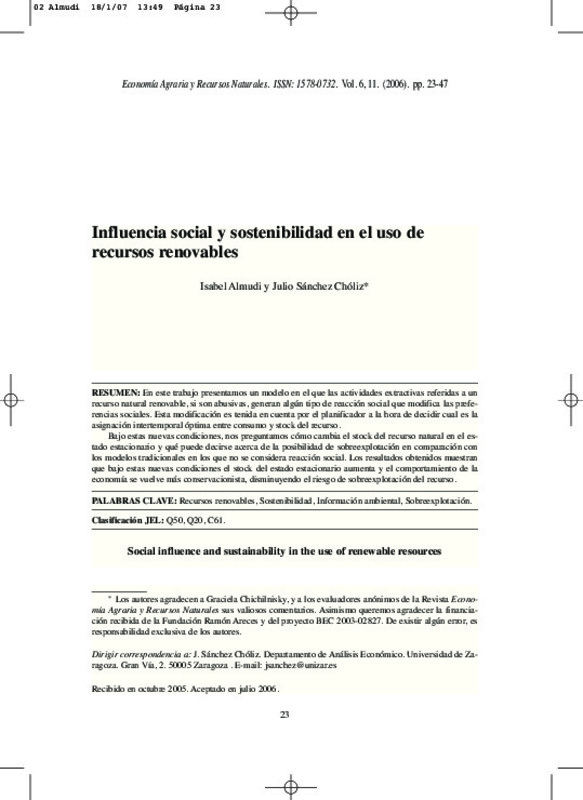JavaScript is disabled for your browser. Some features of this site may not work without it.
Buscar en RiuNet
Listar
Mi cuenta
Estadísticas
Ayuda RiuNet
Admin. UPV
Social influence and sustainability in the use of renewable resources
Mostrar el registro sencillo del ítem
Ficheros en el ítem
| dc.contributor.author | Almudi, Isabel
|
es_ES |
| dc.contributor.author | Sánchez Chóliz, Julio
|
es_ES |
| dc.date.accessioned | 2018-10-18T10:15:39Z | |
| dc.date.available | 2018-10-18T10:15:39Z | |
| dc.date.issued | 2006 | |
| dc.identifier.issn | 1578-0732 | |
| dc.identifier.uri | http://hdl.handle.net/10251/110850 | |
| dc.description.abstract | [EN] In this paper we present a model in which we show that if the withdrawal activities referring to a renewable resource are abusive, they generate a social reaction of some kind that changes the social preferences. This change is taken into account by the social planner in deciding the optimal allocation between consumption and stock of the resource. Given these new conditions we ask how the stock of the resource in the steady state changes and what can be deduced about the chance of overuse of the resource. At the same time we compare these results to the ones obtained with traditional models which did not take social reactions into account. The conclusions obtained show that with these new conditions the stock of the steady state increases and the economy behavior becomes more conservative, diminishing the chance of overuse of the resource. | es_ES |
| dc.description.abstract | [ES] En este trabajo presentamos un modelo en el que las actividades extractivas referidas a un recurso natural renovable, si son abusivas, generan algún tipo de reacción social que modifica las preferencias sociales. Esta modificación es tenida en cuenta por el planificador a la hora de decidir cual es la asignación intertemporal óptima entre consumo y stock del recurso. Bajo estas nuevas condiciones, nos preguntamos cómo cambia el stock del recurso natural en el estado estacionario y qué puede decirse acerca de la posibilidad de sobreexplotación en comparación con los modelos tradicionales en los que no se considera reacción social. Los resultados obtenidos muestran que bajo estas nuevas condiciones el stock del estado estacionario aumenta y el comportamiento de la economía se vuelve más conservacionista, disminuyendo el riesgo de sobreexplotación del recurso. | es_ES |
| dc.language | Español | es_ES |
| dc.publisher | Universitat Politècnica de València | |
| dc.relation.ispartof | Economía Agraria y Recursos Naturales - Agricultural and Resource Economics | |
| dc.rights | Reserva de todos los derechos | es_ES |
| dc.subject | Recursos renovables | es_ES |
| dc.subject | Sostenibilidad | es_ES |
| dc.subject | Información ambiental | es_ES |
| dc.subject | Sobreexplotación | es_ES |
| dc.subject | Renewable Resources | es_ES |
| dc.subject | Sustainability | es_ES |
| dc.subject | Environmental Information | es_ES |
| dc.subject | Overuse | es_ES |
| dc.title | Social influence and sustainability in the use of renewable resources | es_ES |
| dc.title.alternative | Influencia social y sostenibilidad en el uso de recursos renovables | es_ES |
| dc.type | Artículo | es_ES |
| dc.date.updated | 2018-10-18T09:55:33Z | |
| dc.identifier.doi | 10.7201/earn.2006.11.02 | |
| dc.rights.accessRights | Abierto | es_ES |
| dc.description.bibliographicCitation | Almudi, I.; Sánchez Chóliz, J. (2006). Social influence and sustainability in the use of renewable resources. Economía Agraria y Recursos Naturales - Agricultural and Resource Economics. 6(11):23-47. https://doi.org/10.7201/earn.2006.11.02 | es_ES |
| dc.description.accrualMethod | SWORD | es_ES |
| dc.relation.publisherversion | https://doi.org/10.7201/earn.2006.11.02 | es_ES |
| dc.description.upvformatpinicio | 23 | es_ES |
| dc.description.upvformatpfin | 47 | es_ES |
| dc.type.version | info:eu-repo/semantics/publishedVersion | es_ES |
| dc.description.volume | 6 | |
| dc.description.issue | 11 | |
| dc.identifier.eissn | 2174-7350 |








